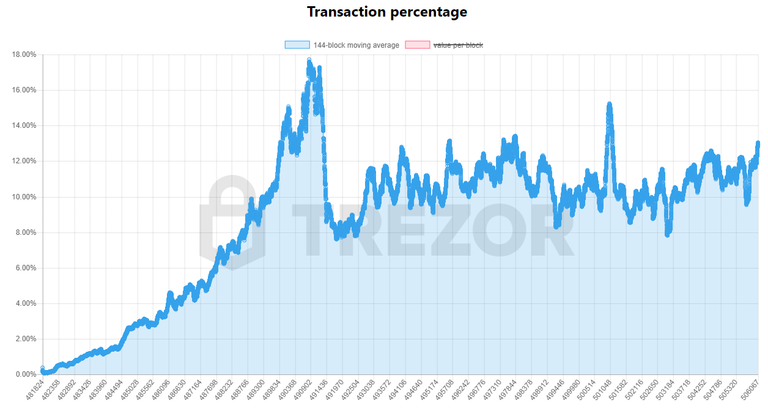
The transactions in the Bitcoin blockchain are increasingly expensive, which brings a lot of uncertainty to the cryptocurrency's future. There are, however, some relatively easy ways of reducing the fees that are not that well known.
There's a lot of frustration going on in the bitcoin community. Just to put it into perspective, the medium transaction fee went from a few cents last year to over $ 18 dollars today, which makes the idea of using bitcoin as a day-to-day currency laughable.
Good news is, you don't have to pay those absurd fees unless you want to.
How to Cut the Transaction Fees by Half Right Now
If you've been around the cryptocurrency environment for a while, you've probably heard of SegWit by now. Basically, SegWit is the process by which the block size limit on a blockchain is increased by removing signature data from Bitcoin transactions. When parts of a transaction are removed, this frees up space to add more transactions to the chain.
SegWit has been praised as an improvement that would help scaling the blockchain without adding to the block size. So far, less than 12% of the transactions are making use of the technology, which means there's a lot of room to improve.

Source: http://segwit.party/
Segwit transactions cost on average less than half of a normal bitcoin transaction. However, not all wallets and exchanges support the technology. Harware wallets like Trezor and Ledger already do, and some mobile wallets like Edge and Samourai offer SegWit addresses as well. Bitgo, a web-based wallet, is making use of the new technology for a couple months now.
Coinbase and Blockchain.info are still working on implementing SegWit. They argue that it's a complicated process that needs to be approached carefully in order not to risk their users funds.
The interesting part here is that Coinbase is said to be responsible for over half of bitcoin daily transactions*. It's good to remind that the startup was also one of the more vocal during bitcoin's block size debate, complaining about high fees and arguing that an increase in the block size parameter would help alleviate those expenses.
Estimating the ideal fees
While first-generation wallets don't allow users to choose how much they want to pay for a transaction, it's increasingly common that newer services offer this possibility.
Here is a list of the most used tools to estimate the appropriate fees:
TransactionFee.info
Created by Sergej Kotliar from Bitrefill, this tool allows users to audit their past transactions and verify how optimal they were. It's a great tool to gather insights on what you can optimize for your next transactions.
URL: https://transactionfee.info/
CoinB Estimating Tool
CoinB takes into account the transaction complexity, i.e., how much data is sent with the transaction. Fees also take this into account, meaning that even a transaction equal to $1 could have large fees based on a large amount of data attached to the transaction, while a transaction equal to $1,000 could have a smaller fee if the amount of data attached to it is also smaller.
URL: https://coinb.in/#fees
Johoe's Bitcoin Mempool Statistic
Created by the University of Freiburg computer science researcher Jochen Hoenicke, this toll gives a good idea of what fee is required to get your transaction into the next block.
URL: https://dedi.jochen-hoenicke.de/queue/#all
SegWit Adoption Status
While it doesn't help a lot in determining the optimal fees, it gives you a clear picture of where SegWit adoption is headed to.
URL: http://segwit.party/charts/#
Batching transactions
The concept of batching many transactions into a single transaction is not new. However, it's not been used to an optimal extent by any means.
If more companies were to use batching effectively, bitcoin transaction fees could be reduced by as much as 80 percent, some estimates say. There's a catch though: batching can compromise privacy and potentially result in slower transactions.
While technologies that promise to revolutionize the blockchain are still being tested, such as the Lightning Network, it's important that we press companies to adopt these new technologies and offer custom transaction fees, otherwise we will see increasingly higher fees and a slower network.
TransactionFee.info is a great tool to determine whether a wallet/exchange is using batching, SegWit and also get other insights on how the company is using the blockchain.
*Based on the drastic drop in the transactions backlog when Coinbase went offline.
Hi, how are you doing? I post regularly on subjects related to cryptocurrency and new tech. If you don't want to miss my content, please follow me to get it fresh off the oven.
When I started experimenting with Bitcoin I remember sending change I got from a faucet between wallets for a fee of 0.02$. I guess those days are long over.
One thing I should point out is that Electrum does offer users SegWit transactions. Unfortunately most wallets won't send to it because it uses bench32 addresses when using SegWit.
Also, regarding updates for numerous companies on both SegWit and Bench32; I know it takes time, but they do employ groups of developers to develop. It seems most wallets are lagging behind, although maybe it's just expecting too much.
I know Electrum and also Mycelium support SegWit addresses, I guess I forgot to mention them. I think it does take some time to get it right, and huge companies like Coinbase can't afford mistakes. Nevertheless, I still think it's up to us users to make sure they're doing their best to get it going. Hopefully we'll see those fees begin a steep descent in 2018.
SegWit is being adopted in 2018
Hi @decentralization, you mean it's going to be adopted by Coinbase?
Hello, please follow the rules of the group Steemit for Resteem ↕ and you will be resteemed by the most active members in the group.
You have to resteem a post from the group before you post yours there.
Here is : HOW TO RESTEEM ON STEEMIT ?